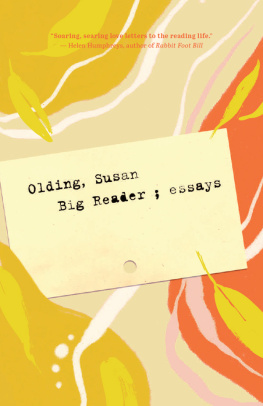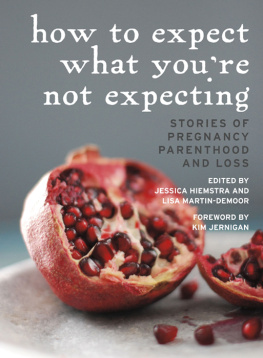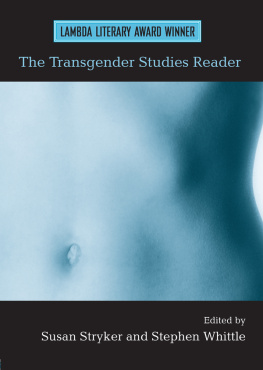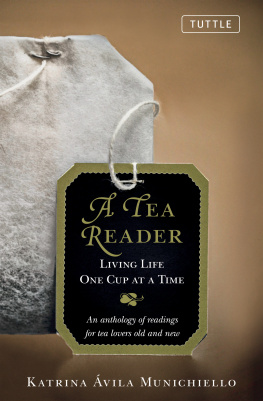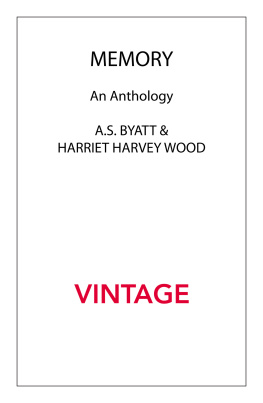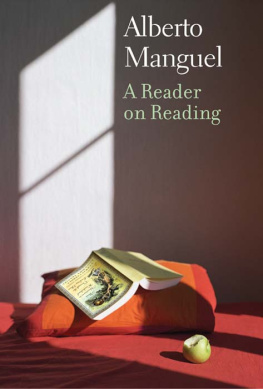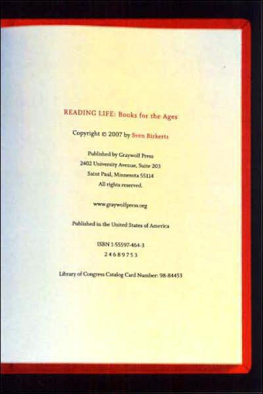Contents
Guide
SUSAN OLDING 2021
All rights reserved. No part of this publication may be reproduced, stored in a retrieval system, or transmitted in any form or by any means, graphic, electronic, or mechanical including photocopying, recording, taping, or through the use of information storage and retrieval systems without prior written permission of the publisher or, in the case of photocopying or other reprographic copying, a licence from the Canadian Copyright Licensing Agency (Access Copyright), One Yonge Street, Suite 800, Toronto, Ontario, Canada, M5E 1E5 .
Freehand Books acknowledges the financial support for its publishing program provided by the Canada Council for the Arts and the Alberta Media Fund, and by the Government of Canada through the Canada Book Fund.

Freehand Books
515815 1st Street SW Calgary, Alberta T2P 1N3
www.freehand-books.com
Book orders: UTP Distribution
5201 Dufferin Street Toronto, Ontario M3H 5T8
Telephone: 1-800-565-9523 Fax: 1-800-221-9985
Library and Archives Canada Cataloguing in Publication
Title: Big reader : essays / Susan Olding.
Names: Olding, Susan, author.
Description: Includes bibliographical references.
Identifiers: Canadiana (print) 20200372246 | Canadiana (ebook) 20200372432 | ISBN 9781988298818 (softcover) | ISBN 9781988298825 ( EPUB ) | ISBN 9781988298832 ( PDF )
Subjects: LCSH : Olding, Susan. | CSH : Authors, Canadian (English) 21st century Biography. | LCGFT : Autobiographies. | LCGFT : Essays.
Classification: LCC PS8629 . L45 Z46 2021 | DDC C818/ . dc23
Edited by Naomi K. Lewis
Book design by Natalie Olsen, Kisscut Design
Cover image Kristina Balashova
Author photo by Hlne Cyr
Printed on FSC recycled paper and bound in Canada by Friesens
Grateful acknowledgment is made to reprint the following previously published material. : Copyright 1966 by W.H. Auden, renewed. Reprinted by permission of Curtis Brown, Ltd.
For Mark
Leaves
Years do odd things to identity.
What does it mean to say
I am that child in the photograph
at Kishamish in 1935?
Might as well say I am the shadow
of a leaf of the acacia tree
felled seventy years ago
moving on the page the child reads.
Might as well say I am the words she read
or the words I wrote in other years,
flicker of shade and sunlight
as the wind moves through the leaves.
URSULA K . LE GUIN
Possibilities
Possible places to bring a book: your bed, under the blankets, with a flashlight. The bath. The back seat of the car, if you are brave, or foolish, or lucky enough never to get sick on the winding roads, or smart enough to open a window against the fumes of your parents cigarettes, smart enough to peel your eyes from the page every once in a while and watch the telephone poles flit past, flit past.
Try the fork of an apple tree in May, where you can prop your feet against the facing branch and suck the scent of blossoms from your lungs to the soles of your shoes. Behind the neighbours house the sun will sink, staining the sky the shade of pink at blossoms core. Petals and page gleam white and whiter in the half-light.
The doctors office, the dentists, the lunch counter at the local delicatessen; the dock, the deck, the porch, the beach. The couch in the room where everybody else watches TV ; sink unseen into its green cushions, leaf through a dozen chapters to the ripples of canned laughter.
The schoolroom, where you can slip your book inside the regulation reader; while your classmates sound out words like see Spot run, your tongue can try on catapult, and luminous, and ravishing, and riverine.
Tap the syllables against your teeth, roll them like a chocolate egg along the roof of your mouth; savour your guilty, solitary joy. Rain splatters the windowsills, radiators hiss and hum, the air reeks of mucilage and damp mittens, while forgotten, at the back of the room, you lose yourself in story and sound, where with your secret book within a book, you might be any she or he or they or we or I.
In Anna Karenina Furs
SO COLD , IT HURT TO BREATHE . The squeak and crunch of snow beneath my boots, a flicker of lights from across the frozen lake. I walked quickly, swinging my arms, my whole frame vibrating, struck like a crystal goblet and still ringing. The cold, I told myself. Its only the cold that makes me shiver.
It was mid-January, the night of my thirty-second birthday, and I was on my way to my legal ethics professors house for supper. My husband, also a student Ill call him Arthur was out of town, visiting his family. He hadnt seen them over the holiday, and Id sent him off with my slightly grudging blessing. Later, I felt sorry for myself. I didnt want to be alone. So, when my teacher, Mark I called him that even then stopped by to drop off some materials, I invited him for tea. We talked, and kept on talking, and eventually he suggested we continue the conversation over an evening meal.
Mark and his wife had separated a few years earlier, and she was living in their former home. He was renting a place from a colleague on sabbatical. The main rooms of the house were fronted with glass, and, as I approached it through the darkness, it glowed. From the street, I could see Mark setting the table. I didnt find him handsome. Although he was tall and dark, he was thin and wore nerdy eyeglasses. But I liked the way he moved. There was something graceful in the way he held himself, something deft and alert in his attitude. I thought about my husband, who was also tall and thin, but who seemed so much heavier, somehow, with his big raw bones. All autumn and winter, hed been sleeping ten hours a night or more, and still he was always tired.
Mark cooked salmon in stimpirata sauce with celery and capers. There was salad and a citrus tart. A crisp but oaky Chardonnay. Toward the end of the meal, his twelve-year-old daughter came home he and his ex-wife were sharing custody and told us about the movie shed seen with her friends, her ringlets trembling as she laughed. Some wax from the candles dripped onto the cloth. I scraped it up and pressed it, warm, between two fingers. When I pulled them apart, the wax held the delicate imprint of their whorls.
I walked home through Breakwater Park under a bright moon, the snow glistening and my toes losing their feeling. I considered the evening. Nothing had happened. But in the night, I dreamed of him, and when I woke, I knew that everything had changed. Nonsense, I told myself. Its not as if Ive done anything. I dont even intend to do anything. Im not some Anna Karenina.
THE STORY IS FAMILIAR . Anna the beautiful, lively wife of Alexei Karenin, a dry bureaucrat falls in love with a dashing army officer named Vronsky, and the two begin an affair that becomes the talk of St. Petersburg. Annas husband reacts badly. In desperation, Anna and Vronsky run away, first to Europe, and then to the Russian countryside. There, Anna, barred from polite society and tormented by guilt, becomes increasingly jealous and paranoid, imagining that Vronsky no longer loves her. They quarrel, and, in drug-induced confusion and despair, Anna throws herself beneath the wheels of a train.

